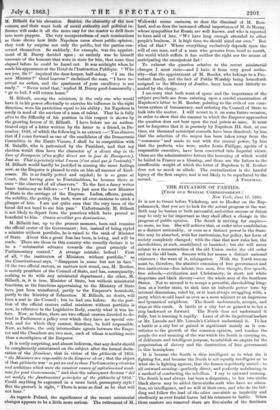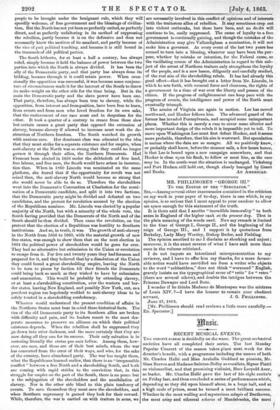THE SITUATION OF PARTIES.
[FROM OUR SPECIAL CORRESPONDENT.]
New York, June 17, 1863. IT is not to Grant before Vicksburg, not to Hooker on the Rap- pahannock, that you are to look for the actual progress in the war. Both may be beaten or both successful, and either success or defeat may be only so far important as they shall effect a change in the progress of public opinion. The South is striving for empire— no more, no less. She will achieve that, or suffer utter annihilation as a distinct nationality, or even as a distinct power in the State. She may be absorbed, with her institutions, her policy, her form of society completely changed; with the class that now rules her, the slaveholders, as such, annihilated or banished ; but she will never submit to a reconstruction of the old Union under the old order and on the old basis. Success with her means a distinct national existence ; the want of it, subjugation. With the North success must be, therefore, the absolute extension of free government and free institutions—free labour, free men, free thought, free speech, free schools,—civilization and Christianity, in short, not white despotism and black slavery—over the whole area of the Southern States. Not to succeed is to accept a powerful, slaveholding king- dom as a border state, to sink into an imbecile power torn by internal dissensions, ruled by, or at least always struggling with, a party which would hand us over as a mere adjunct to an imperious and tyrannical neighbour. The South understands, accepts, and aims at this result. A battle or a city lost or gained is to her a step backward or forward. The North does not understand it fully, but is learning it rapidly. Least of all do its political leaders or Mr. Lincoln and Mr. Lincoln's Cabinet understand it. To her a battle or a city lost or gained is significant mainly as it con- tributes to the growth of the common opinion, and teaches the people the real meaning of the war which the South is carrying on, of deliberate and intelligent purpose, to establish an empire for the perpetuation of slavery and the destruction of free government in this hemisphere.
It is because the South is thus intelligent as to what she is fighting for, and because the North is not equally intelligent as to what she is fighting against, that the former is perfectly united - to all outward seeming—perfectly direct, and perfectly unfaltering in a method of conducting the rebellion. I say to outward seeming. The South is and always has been a despotism ; to her two-sixths black slaves may be added three-sixths serfs who have no educa- tion, no intelligence, and no will of their own, and who do the bid- ding and follow the lead of the other one-sixth as implicitly and obediently as ever feudal baron led his retainers to battle. When these masters are removed there are five-sixths of the Southern
people to be brought under the benignant rule, which they will speedily welcome, of free government and the blessings of civiliza- tion. But the North has not yet been so perfectly united, so perfectly direct, and so perfectly unfaltering in its method of suppressing the rebellion, partly because it is on the defensive and does not necessarily know the motives of its assailant, and partly because of the vice of past political teaching, and because it is still bound in the trammels of old political parties.
The South hitherto, for at least a half a century, has always ruled, simply because it held the balance of power between the two parties into which the North is always divided. It has been the ally of the Democratic party, and that party has always done its bidding, because through it it could retain power. When occa- sionally the opposition was successful, it was because some conjunc- ture of circumstances made it for the interest of the South to throw its make-weight on the other side for the time being. But in the main the Democratic party and the slave power have been one. That party, therefore, has always been true to slavery, while the opposition, from interest and from position, have been free to learn, from events and from men who loved freedom for its own sake, that the enslavement of one race must end in despotism for the other. It took a quarter of a century to create from these slow but certain causes a great party that opposed the extension of slavery, because slavery if allowed to increase must work the de- struction of Northern freedom. The South watched its growth with anxious care. Her dominant class was educated to the idea that they must strike for a separate existence and for empire, when anti-slavery at the North was so strong that they could no longer govern it through their allies, the Northern Democrats. Had Fremont been elected in 1856 under the shibboleth of free land, free labour, and free men, the South would have arisen in insurrec- tion then. When in 1860 Lincoln was nominated on the same platform, she feared that if the opportunity for revolt was not seized then, the anti-slavery North would become so strong that she would never be able to do so. Therefore the slaveholders went into the Democratic Convention at Charleston for the nomi- nation of a Democratic candidate, and split it into two factions, that the Democratic party might be divided and defeated on two candidates, and the pretext for revolution secured by the election of the Republican nominee. Mr. Lincoln was elected by a popular majority of the North, but with a minority of the whole vote, the South having provided that the Democrats of the North and of the South should be thus divided. Then came the revolution, on the pretext that the election of a Republican was hostility to Southern institutions. And so, in truth, it was. The growth of anti-slavery in the North from 1856 to 1860, with the material growth of new free states, was enough to show them that on the next election in 1864 the political power of slaveholders would be gone for ever. They had no alternative but submission in the Union or revolution to escape from it. For five and twenty years they had foreseen and prepared for it, and they believed that by a dissolution of the Union they could found a great slaveholding empire, leaving the North to be torn to pieces by faction till their friends the Democrats could bring back so much as they wished to have by submission and annexation. This would be probably by extending slavery, or at least a slaveholding constitution, over the western and bor- der states, leaving New England, and possibly New York, out, as a pestilent region too hopelessly wedded to anti-slavery ideas to be safely trusted in a slaveholding confederacy.
Whoever would understand the present condition of affairs in the Northern States must bear in mind these historical facts. The ties of the old Democratic party to its Southern allies are broken with difficulty and pain, and its leaders resort to the most des- perate measures to preserve an alliance on which their political existence depends. When the rebellion shall be suppressed they go down into utter darkness, and the more certainly that they are now doing all they can for its success. Their only salvation is in restoring literally the status quo ante helium. Among them, how- ever, are men, and these are of their best minds, whom the war has converted from the error of their ways, and who, for the sake of the country, have abandoned party. The war has taught them, what the Republicans learned earlier, that there is an "irrepressible conflict" between a free North and a slaveholding South, and both are coming with rapid strides to the conviction that, in this struggle for empire on the part of the South, there is no peace but n the subjugation of the slaveholders and the annihilation of slavery. Nor is the other side blind to this plain tendency of events. To save themselves they must save the slaveholders, and when Southern supremacy is gained they look for their reward. While, therefore, the war is carried on with traitors in arms, we are necessarily involved in this conflict of opinions and of interests with the traitorous allies of rebellion. It may sometimes crop out into violent outbreaks, but these have been, and no do ibt will continue to be, easily suppressed. The cause of loyalty to a free government is continually gaining, and though the mistakes of the Administration may give Vallandigham a nomination, it will not make him a governor. As every event of the last two years has seemed to turn into a blessing, whatever may have been the pur- pose, whether by mistake or intention, for the Federal cause, so the vacillating course of the Administration in regard to this sub- ject of the arrest of Northern traitors only strengthens the loyalty of the people, and is a new lesson, diligently and carefully studied, of the real aim of the slaveholding rebels. It has had already this good effect---that it has brought out a letter from Mr. Lincoln, in which he sets forth, with unusual force and clearness, the rights of a government in a time of war over the liberty and person of the citizen. If the progress of enlightenment can keep pace with the progress of events, the intelligence and power of the North must eventually triumph.
The armies of Virginia are again in motion. Lee has moved northward, and Hooker follows him. The advanced guard of the former has invaded Pennsylvania, and occupied some unimportant places. Whether this is merely a ruse to cover some ulterior and more important design of the rebels it is impossible yet to tell. To move upon Washington Lee must first defeat Hooker, and it seems more probable, therefore, that his aim is westward. But speculation is useless where the data are so meagre. All we positively know, or probably shall know, before the steamer sails, a few hours hence, is that Lee is bound upon a new campaign somewhere, and that Hooker is close upon his flank, to follow or meet him, as the case may be. In the south-west the situation is unchanged. Vicksburg and Port Hudson still hold out, though closely besieged by Grant































 Previous page
Previous page